IFLA President’s Meeting 2019: New Perspectives, New Possibilities and a Call to Action for Libraries as Motors of Change
31 May 2019

With the agreement of the United Nations 2030 Agenda in 2015, the world’s governments underlined the importance of access to information as a driver of development. The 2019 IFLA President’s Meeting, held in Buenos Aires, Argentina on 23 May, explored how libraries, as guarantors of this access, can be motors of change, and saw a call to action to all participating, in person and online.
Information has never played a more important role in our societies. Those who have access and the skills to use it are able to take seize opportunities, take better decisions and innovate. Those without risk being left behind.
Libraries have an essential role in preventing this from happening, ensuring access to information for all. IFLA’s President’s Meeting, the second of the term of IFLA’s President 2017-19, Glòria Pérez-Salmerón, shared examples of how libraries achieve this, and the key issues they face in doing so, under the title Motors of Change: Libraries and Sustainable Development.

Glòria Pérez-Salmerón opened the event, underlining:
To change the attitudes and actions of others we need to be smart. To understand the issues that our institutions face, that the communities we serve face. To change our own mindsets, and to be confident in our assessments, innovative in our planning, and united in our action. And to explain this in a language that decision-makers understand.

IFLA Secretary General Gerald Leitner oversaw the programme. Welcoming participants to the day, he noted that:
This meeting comes in a time of change in IFLA itself, as we look to build a stronger, more united library field. Better able to serve users with changing needs, in a changing world. Better able to support the search for solutions to global challenges. Better able not only to survive, but to thrive into the future.
Greener, Fairer, Better Informed
In an opening session, the United Nations Resident Coordinator in Argentina, René Mauricio Valdes, shared insights into the UN 2030 Agenda, and the urgency to accelerate efforts to achieve it. He noted the role that libraries could play in changing behaviours and raising awareness of the SDGs.
Professor Tim Unwin, one of the guest authors of the 2019 Development and Access to Information report stressed that in parallel with efforts to ensure growth and sustainability at the macro level, it was vital to think about equality. Indeed, this was often overlooked, but was critical in order to deliver a desirable world by 2030. Libraries, he underlined, could be champions of this by helping to bridge digital and information divides.
Finally, IFLA and the Technology and Social Change Group at the University of Washington presented the 2019 Development and Access to Information (DA2I) report, stressing both the need for progress across policy areas, and the help that libraries could provide in this regard. Read more about the DA2I in our news story.
From the Global to the Local
In three panels in the afternoon, the audience heard from all of the other guest authors from the DA2I report, as well as other expert speakers from the region.

The first panel, chaired by IFLA President Glòria Pérez-Salmerón, focused on the global level. Karl Falkenberg, former Director General for Environment at the European Commission, set out how global information flows had helped policy makers to understand the issues around climate change. Yet to go further, it was vital that information travelled across disciplines.
Patricia Munoz, former president of La Referencia underlined that Latin America was a leader in making research available, taking major steps towards open access to all research. Wouter Schallier, Head of the Library at the UN Economic Commission for Latin America and the Caribbean, underlined the need for further action to favour sharing of information.

IFLA President-elect Christine Mackenzie chaired the second panel, which looked at the domestic level. Dr Katarina Popovic, Secretary-General of the International Council on Adult Education focused on the need to give everyone the opportunity to develop new skills throughout life. Libraries helped both by providing information about opportunities, and through providing a friendly and welcoming space for people to learn effectively.
Stefania Lapolla Cantoni noted that access to information was also important in matching people to job openings. They agreed that while digital technologies could solve many issues, it was clearer than ever that the support and spaces provided by libraries were still essential to achieve real world change. Finally, Jeimy Hernandez of CERLALC shared experience of how libraries were making a difference to lives in Colombia.

A final panel, moderated by Stephen Wyber of IFLA, focused on the relation between access to information and government. Fabiola Rosales of the Library of the Mexican Chamber of Deputies underlined the commitment of her library to supporting access to government information, as a precondition for accountability and better performance.
Guilherme Canela of the UNESCO office in Montevideo in turn set out the need to work with citizens to ensure that they seized their right to information, and used it. Finally, DA2I author Dorothy Gordon warned that alongside the impact of information on the way we are governed, we also needed to think about the way governments shaped the information people see, for example through internet regulation.
A Call to Action
Closing the afternoon, IFLA Secretary-General Gerald Leitner called on participants to continue the spirit of the meeting by keeping their minds open, to keep talking, to keep learning, to keep advocating for libraries, and to keep working together. This would be key to IFLA’s ongoing work to build a strong and united library field.
 IFLA President Glòria Pérez-Salmerón gave the final words, encouraging all participants, both in the room and online to go out and spread the message that ‘information should not be a divider but a bridge. Libraries in turn should be seen not as a cost but an investment. Not as a thing of the past, but an essential partner for any country serious about achieving the Sustainable Development Goals’.
IFLA President Glòria Pérez-Salmerón gave the final words, encouraging all participants, both in the room and online to go out and spread the message that ‘information should not be a divider but a bridge. Libraries in turn should be seen not as a cost but an investment. Not as a thing of the past, but an essential partner for any country serious about achieving the Sustainable Development Goals’.
IFLA is grateful to the Library of Congress of the Argentine Nation for their indispensable help in organising the event. We are also very grateful to our partners and sponsors for their support. A full list of sponsors is available on the President’s Meeting website.
The President's Meeting 2019 was live streamed and a full recording of the event will soon be available. Check the Biblioteca del Congreso de la Nación's YouTube channel. A photo album is available on IFLA's Flickr.